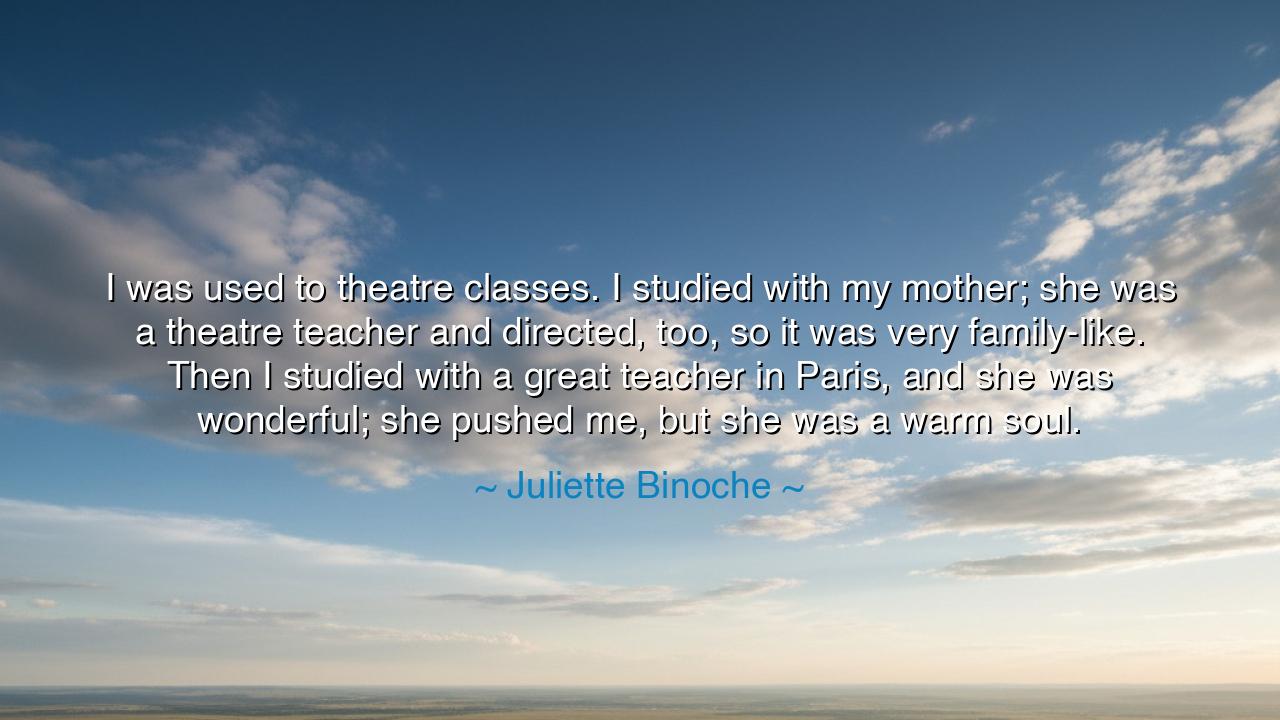
I was used to theatre classes. I studied with my mother; she was
I was used to theatre classes. I studied with my mother; she was a theatre teacher and directed, too, so it was very family-like. Then I studied with a great teacher in Paris, and she was wonderful; she pushed me, but she was a warm soul.






In these words spoken by Juliette Binoche, there echoes not only the memory of a daughter learning in the warmth of her mother’s embrace, but also the eternal rhythm of apprenticeship itself. She speaks of theatre classes, of a world shaped not merely by rules and technique, but by the intimacy of family, by the passing of wisdom from one generation to the next. Here, the art of performance was not something coldly dissected in halls of theory, but lived and breathed within a household, as natural as the beating of the heart. To learn in such a way is to be nourished at the roots, so that every act upon the stage draws not only from training, but from love itself.
Yet Binoche’s tale does not end with the hearth. She recalls her time with a teacher in Paris, a woman who was both demanding and compassionate, who “pushed” her while still radiating warmth. This is the balance of true mentorship: the ability to stretch the pupil toward horizons unseen, while ensuring the soul does not break in the effort. Too harsh a hand makes the spirit brittle; too soft a hand leaves it undeveloped. In her teacher’s method, Binoche found the alchemy of growth—rigor mingled with tenderness, ambition joined to humanity.
We see here an eternal pattern. The ancients too spoke of this balance. In the dialogues of Plato, Socrates presses his companions with unyielding questions, stripping away falsehoods until only truth remains. Yet those who listened felt not cruelty, but care—for beneath his sharpness lay a profound concern for the awakening of the mind. Just as Binoche was guided by her Parisian mentor, so too did the youths of Athens feel themselves stretched and embraced at once. In both cases, the student thrives not through fear, but through trust in the warmth behind the challenge.
Consider also the story of Alexander the Great and his teacher, Aristotle. The young prince, restless and fiery, might have wasted his gifts on reckless pursuits. But Aristotle’s hand, firm yet wise, shaped the boy into a thinker as well as a warrior. And though Alexander would later surpass even his master’s reach, he carried with him the blend of discipline and inspiration that had been poured into him. Like Binoche, who received from her mother a foundation of love and from her Parisian teacher the fire of ambition, Alexander shows us that greatness is often the child of many teachers, each imparting a different flame.
The lesson here is that education is not merely technique. It is not enough to study lines, memorize movements, or calculate strategies. What makes a human spirit grow is the mingling of warmth and discipline, of roots and wings. Binoche’s story is a mirror for all who would learn, reminding us that in every craft—be it art, science, or life itself—the teacher is not only a guide but also a guardian of the soul.
For the reader who seeks wisdom in these words, take this teaching: seek out those who challenge you, but who also believe in you. A master who drives without compassion will leave you hollow, but one who comforts without pushing will leave you weak. If fortune grants you a teacher who holds both qualities, cling to them with gratitude, for such guides are rare. And if you yourself are called to teach, remember Binoche’s Parisian mentor: to push and yet to nourish, to stretch and yet to hold.
Practically, let each one of us act thus: when learning, ask not only, “What do I know?” but also, “Who is helping me grow?” Surround yourself with companions and mentors who embody warmth and rigor alike. And when guiding others, balance firmness with kindness. Like the roots and branches of a tree, both are needed—one to anchor, the other to reach toward the sky.
So may Juliette Binoche’s words endure not only as a reflection of her own path, but as a torch for all who walk the long road of mastery. Let us be reminded that art, like life, is learned in circles of love, carried forward by the strong hands of teachers, and set aflame by the breath of encouragement. In this union of rigor and soul, all greatness is born.






AAdministratorAdministrator
Welcome, honored guests. Please leave a comment, we will respond soon